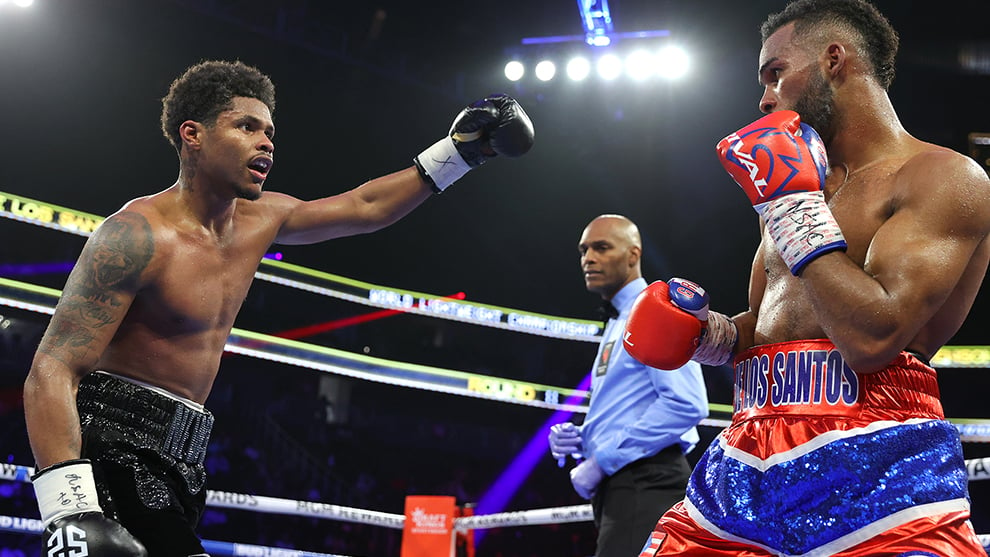WHETHER the result of insecurity, a victim mentality, or a genuine belief, Shakur Stevenson’s reaction to being criticised for the nature of his latest win was to take to social media and label himself “the most hated man in the sport”.
That, as a statement, is patently untrue of course, but it is interesting all the same to see Stevenson react in this way and believe that the thing fuelling the response to his performances is hatred as opposed to the reality: total apathy.
Indeed, to be hated as a boxer in 2024 is, for some, the goal; something aspirational. What comes with it after all is attention, interest, and an emotional investment on the part of the “haters” which can, if used correctly, become something tangible and financially rewarding. A hated fighter, in fact, is one of the most watchable and captivating commodities you can hope to find in boxing, even if their fight-night soundtrack tends to be boos rather than cheers. People want to watch them fight – that is, lose – and people listen to what they say if only to give themselves ammunition to then use against them. It’s not the ideal, no, but, if not loved, being hated is certainly preferable to the alternative, that’s for sure.
The alternative, by the way, is this: being ignored. That, for a boxer, is a death sentence and the worry now with someone like Shakur Stevenson is that both his style and his personality give him a far better chance of being ignored than being hated and talked about. Maybe by calling himself “the most hated man in the sport” Stevenson realises this, too, and is being proactive in ensuring he is not forgotten or irrelevant, particularly when about to embark on a period of free agency following the expiration of his deal with Top Rank. He has certainly been busy on social media following his decision win against Artem Harutyunyan on Saturday (July 6). Picking fights with anyone who dares challenge or criticise him (including fellow fighter Marcus Browne), the WBC lightweight champion has very much adopted a Me against The World mentality and refuses to accept views not in line with his own. Moreover, he has reiterated that he will not change for anyone, nor, as is his right, adapt his style for the satisfaction of armchair critics wanting him to put himself at greater risk when in the ring.

Shakur Stevenson outboxes Artem Harutyunyan (Sarah Stier/Getty Images)
“Most hated man in the sport I appreciate yall for it thank u,” Stevenson, 25, wrote on Sunday (July 7). “Much respect to Artem he came in shape and did what he could last night I respect it.. S\O to the ones who support me fr Yall the ones who keep me going we still undefeated and it’s gone stay that way! Tell your fav fighters jump in the ring since I’m not like that I’ll be ready and waiting. Thank u all for the good and the bad.”
Also on Stevenson’s social media feed were messages directed the way of Floyd Mayweather, his hero. He was captured watching Stevenson’s latest win backstage in Anaheim – where Mayweather’s protégé Curmel Moton had pro bout number four – and the mutual appreciation is an easy thing to understand. Mayweather, after all, was another divisive fighter whose style was too much for many until he reached such a level of fame and stardom it didn’t really matter how he went about winning fights so long as he won them. This was helped considerably by the fact that he landed compelling fights against opponents who mattered and who could bring out the best in him; thus taking him from “Pretty Boy”, an acquired taste with an inordinate amount of skill, to “Money”, a love-hate character who would in time become the biggest draw in the sport.
For Stevenson, 22-0 (10), a similar transition is needed, you feel. To be either loved or hated must be the goal from now on and achieving this goal will require, as he said himself, other fighters – big names, ones with star power – to share a ring with him and in so doing allow Stevenson, a fine technician, the chance to have his difficult style start to make sense in the eyes of the general public; for whom boxing need always be a very basic, primal and easily understood language.
Until then, the idea of Stevenson being either loved or hated is a fantasy. For at this stage, irrespective of a few mean tweets, the man from Newark hasn’t generated nearly enough interest for fans to even care about his progress, much less hate what he represents. They are instead, for the most part, indifferent, blasé. They are not stimulated, either by Stevenson as a personality or his fights as entertainment, to feel strongly one way or another.
This is why, generally speaking, the boos heard on exit are never the same as the boos heard prior to the first bell. The latter suggests engagement, and a degree of anticipation, whereas the former – which, alas, has cruelly become the soundtrack to Stevenson fights – suggests no more than boredom. Meaning: the “most hated man in the sport” is not the guy you boo on the way out, but instead the guy you boo on the way in. The one you boo on the way out is the one you never want to watch again.
